Scientists have decoded the genome of a snail involved in the spread of a deadly parasitic disease.
They say the information will help in the fight against schistosomiasis, an infection caused by a parasitic worm that lives in streams and ponds, according to BBC.
The disease affects millions of people a year in sub-tropical and tropical regions.
More than 100 researchers from around the world have unlocked the DNA secrets of a snail that transmits the parasite.
They say it will help in the understanding of the snail’s biology, including new ways to stop the parasite spreading to people.
“Having the knowledge means we can progress at a much faster pace at understanding the disease and reducing the number of people infected,” said Dr Joanna Bridger of the University of Brunel, a co-researcher on the study.
The snail (Biomphalaria glabrata) is found in South America.
Related snails are responsible for transmitting the parasite in sub-Saharan Africa, where most cases occur.
People become infected when larval forms of the parasite – released by freshwater snails – penetrate the skin in contaminated water.
In the body, the larvae develop into adult worms, which live in the blood vessels and release eggs.
Some of the eggs are passed out of the body to continue the parasite’s lifecycle.
Others become trapped in body tissues, causing damage to organs.
There is no vaccine for schistosomiasis and current control measures involve mass administration of the drug, praziquantel.
Scientists now hope to develop new treatments, perhaps by disrupting the snail’s mating habits.
The information will also be useful in tracking snail populations that differ in how they transmit the parasites.
“This work provides several inroads for control of Biomphalaria snails to reduce risks of schistosome (re) infection of endemic human populations, an important component of the WHO strategy aimed at elimination of the global health risks posed by schistosomiasis,” said the researchers in the journal, Nature Communications.
Scientists now hope to develop new treatments, perhaps by disrupting the snail’s mating habits.
The information will also be useful in tracking snail populations that differ in how they transmit the parasites.
“This work provides several inroads for control of Biomphalaria snails to reduce risks of schistosome (re) infection of endemic human populations, an important component of the WHO strategy aimed at elimination of the global health risks posed by schistosomiasis,” said the researchers in the journal, Nature Communications.
H.Z

